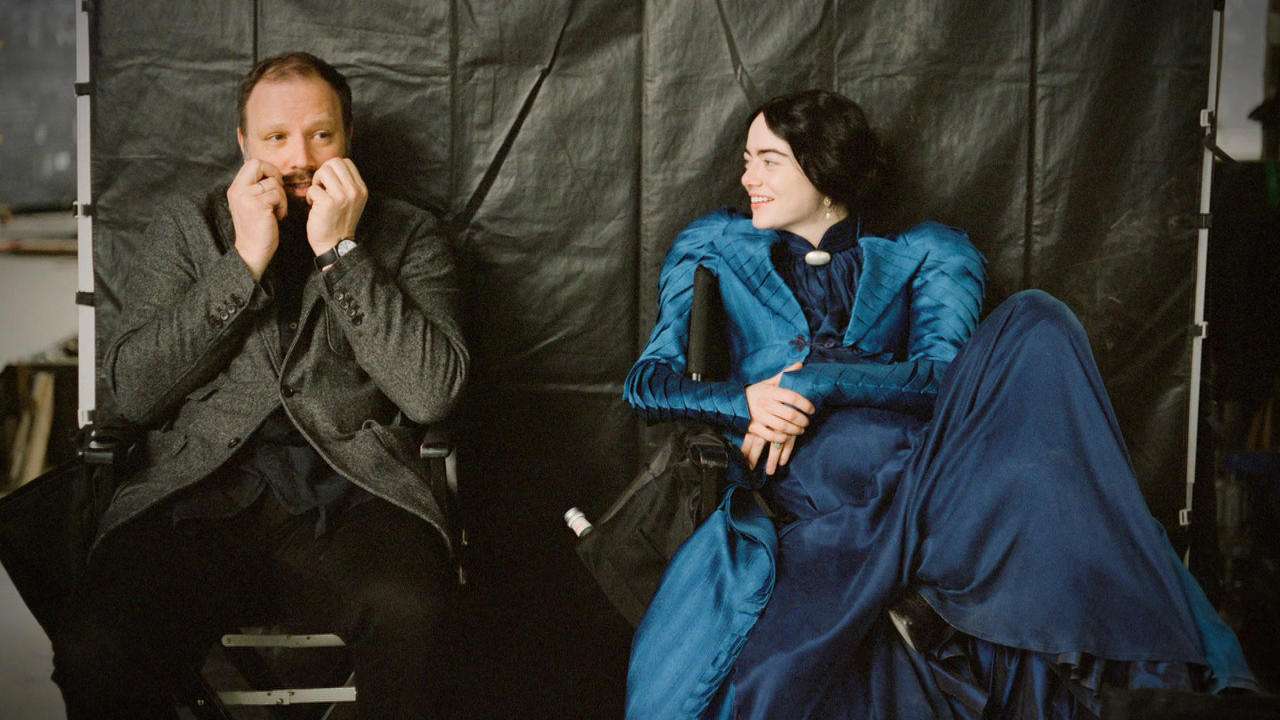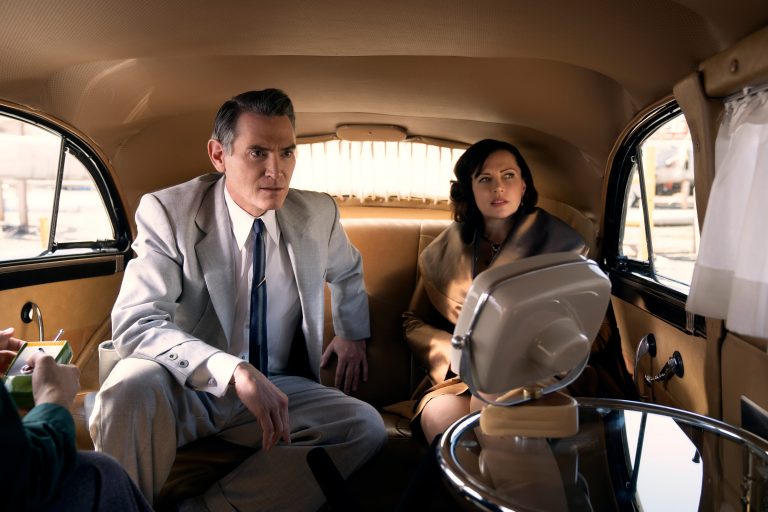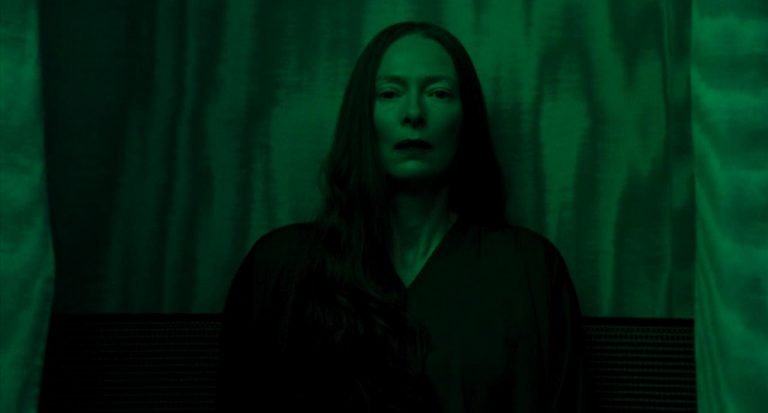Manhunt (Series Finale) Episode 7 Recap: “Manhunt,” adapted from John L. Swanson’s book, deals with the aftermath and the underlying reasons behind the Lincoln Assassination as much as it explores the immediate aftermath. The series finale (appropriately titled “The Final Act”) chooses to explore and finally tie up all the loose ends and grant closure to all the political machinations that had begun since Lincoln’s assassination.
Manhunt (Series Finale) Episode 7 “The Final Act” Recap:
“Manhunt” always had one foot in the past because Lincoln’s presence always reigned in all the episodes, more profoundly on Stanton. The finale’s opening emphasizes that when we ostensibly see Stanton being invited for the first time to the Lincoln House three years before the assassination, The Lincoln House was the epitome of celebration, as we witnessed Mary Todd Lincoln fretting about and entertaining her guests at the party while worrying about her son’s fever. And while Abe and the doctor reassure her that he will be okay and that sleep is the only recourse, the truth is more dire. Lincoln’s son only has a few hours, and Lincoln is okay to let his wife enjoy one brief respite before the next morning brings in fresh pangs of sorrow.
Even amidst this personal turbulence, Lincoln takes Stanton outside the room before asking him to be the Secretary of War, only because “Mars,” as he is nicknamed by Stanton, believes in simplicity in solving complicated politics. Mars’ insistence on strengthening lines of communication using the telegram to convince their soldiers to hold the line convinces Lincoln to bring him to his inner circle. That trust in Lincoln is what drives Stanton towards proving the existence of a grand conspiracy, not only to ensure that Lincoln gets justice but also that his aim for reconstruction is finally fulfilled.
How much had Jefferson Davis been involved?
One of the central tenets of proving the existence of a grand conspiracy would be to connect John Wilkes Booth with Confederate President Jefferson Davis. It simply isn’t enough to just accuse David Herold, Mary Surratt, George Atzerod, and Lewis Powell of being directly involved in the murder of President Lincoln and the attempted murder of Secretary of State Seward. Neither would simply point out Davis’ involvement be enough for the court to be adjourned simply because it is a shocking accusation to directly point to Davis as the one who ordered Lincoln’s murder. Considering that Davis is unrepentant about his cause, believing that his tribalism would exist long after he had gone, his involvement being proven would be especially impactful.
Meanwhile, Lafayette Baker is shaken by Conover’s shifting allegiances, or more importantly, the fact that Conover acting as a double agent might be proven as a triple agent, and he might be working for the Confederacy after all if the discoveries in Sanders’ safe containing all the aliases of Conover are any indication. However, Conover proves to be useful because he is believed to own the document known as “Pet Letter,” whose title itself serves as the smoking gun; “Pet” is the moniker given by Davis to Booth.
How does Mary Simms’ testimony affect the trial of Dr. Mudd?
What makes Manhunt’s finale stand out is how each minute character, every moment, and every interaction begin to matter within the framework of the trial. It is proven right by Dr. Mudd’s attempt at establishing a character certificate of above reproach, which he had begun in the previous episode by slipping in money to an African American neighbour. To combat the ingrained prejudice exhibited by the judges, Simms tries to cover all bases. He first convinces his brother to take the stand, and when his brother hesitates to show his vulnerability in front of the world or just the courtroom, Simms brings him to Stanton to help him be convinced. That turns out to be the impetus for Milo to shakily share how Mudd’s abuse had resulted in Milo’s bum leg and a shattering of confidence.
Simms also manages to convince Louis Weichmann, whose friendship with Surratt had already been looked upon with mild suspicion in the previous episodes by Stanton. When called to the stand, Mary acknowledges that Mudd not only knew the members of the CSS, including John Surratt, but he shared their sentiments as well. In response, Mudd’s lawyer attacks her character and lack of education, and Simms bravely calls him out, asking him to inquire about this with Louis Weichmann. That also turns out to be crucial because Weichmann finally admits that not only had he been friends with Surratt but also had a sexual relationship with him. So Weichmann had all the reasons for testifying against Simms, but he acknowledges that Simms is telling the truth, and he believes her. It was enough for Mudd to be sentenced to life imprisonment and hard labor.
How does Conover’s testimony become tainted?

Conover, in taking the stand, admits that he had been the source within CSS rather than having a separate source. He admits that on the day of General Lee’s surrender, the first plan to set “the pet” loose had been put in motion. Conover acknowledges that not only did the confederacy want to throw the Union into chaos by assassinating the President, Vice President, and Secretary of State, but he also produced the letter proving that Sanders had been kept abreast of the details of the conspiracy.
But Conover’s testimony was put into serious doubt and proved wrong as well when, by extrapolating his multiple identities and his propensity for lying, the defense proves that Conover had lied about the date he had seen Surratt, Booth, and Sanders in the same room together when records prove that he had been in prison. Conover finally admits to misspeaking but emphasizes that he had seen the three men in the same room. However, the damage had been done.
When the court reconvenes, the chief judge admits that he believes that Davis ordered Lincoln’s assassination and set this entire plan in motion. However, the evidence turned out to be insufficient to prove Davis’ connection. However, it would be enough to hand out sentences, which would be read by Stanton. Mary Surratt, David Herold, Lewis Powell, and George Atzerod were found guilty and sentenced to death by hanging; Edward Spangler was sentenced to life imprisonment.
After the verdict had been announced, Conover revealed to Baker and Stanton that he had received a mysterious package from London from the previous agent, proving Sanders had found something to scare off Conover. Another fascinating revelation that never comes is the 18 pages that Stanton tore off from Booth’s diary, which might have implicated him in the attempted assassination of Jefferson Davis, which had been hinted at way back in episode 3.
Manhunt (Series Finale) Episode 7 “The Final Act” Ending Explained:
How does Stanton ensure the reconstruction plan of Lincoln goes through?
Even though Stanton had managed to extract justice, he knew that he was on thin ice with the new president. On the day of his fundraiser, Johnson arrives with Thomas Lorenzo, which makes Stanton realize that Johnson wants to replace him. Replacing him would ensure that Johnson had a smoother era at the office and not have to implement the reconstruction plan, which he and his donors had been very much against. Stanton reminds him that trying to remove Stanton from office would put Johnson against Congress and put him in the crosshairs of impeachment. Stanton challenges him back, reassuring him that he can handle Congress.
While calmly deciding to let Lorenzo have a tour of the office while he packed his belongings, Stanton is reminded again of why he is doing this. His faithfulness towards Abe, and more importantly, his belief in the mission, strengthens him, reminding him that the fight hasn’t ended. The last time he had tried to resign, Abe had refused, urging him to remain and stay the course. Stanton barricades himself inside the war office and stays there for over three months, connecting with his troops down in the south to hold their position and not listen to orders about being recalled. Johnson would try to remove him from the War Department but would get impeached instead. He remained in office by a single vote but wouldn’t return for a second term.
John Suratt Jr. would be extradited to the United States, but he would escape conviction, having been tried in a civilian court in Maryland, which would be susceptible to manipulation. He would later hold anti-Union rallies, proudly declaring his association with Booth and vicariously utilizing Booth’s notoriety. Five months later, the 13th Amendment to the Constitution was ratified, abolishing slavery. Six months after that, the 14th Amendment was passed, granting citizenship and equal protection to African American citizens.
Four years after the assassination, Stanton would be nominated for the post of Supreme Court judge. His health had worsened over the years, with the asthma leading to multiple organ failures. Stanton would later die in his chair, happy that his efforts at reconstruction that he had begun with Abe would attain completion. He would unfortunately not remain alive to witness the results. Two months after Stanton’s passing, the 15th Amendment to the Constitution would be ratified, guaranteeing US citizens, regardless of race or previous enslavement, the right to vote.
Manhunt Review:

One of Apple’s key features as a streaming service is also one they share with Amazon Prime Video: an inclination to allocate budget on content that would have seemed niche. In an era where companies and streaming services are decidedly pulling back from taking risks and indulging in “Peak TV,” Apple is one of those few companies that would still ensure an ostentatious presentation for stories that might have worked on a far more limited budget or runtime.
“Manhunt” seems burdened with premise and expectations. A story about the hunt for Lincoln’s assassin also becomes an exploration of the political and bureaucratic climate of that era. It also becomes, as art usually does, a mirror into the present polarized political climate of the United States while also working to deliver cheap thrills by putting its hand inside conspiracy theories.
At the core of it, though, “Manhunt” just turns out to be bland. There is a certain conflict of focus as a result of the tone here. When the show chooses to delve deeper into the conspiratorial aspects, it works because it plays into the cloak-and-dagger, espionage tone necessary to elicit the thrill and suspense of discovery. But it also forgets to craft an excitement of the chase, as Booth, advertised as one of the central characters, becomes, for the most part, sidetracked, stuck within a forest.
Anthony Boyle, as Booth, is given ample real estate to play into and introduce wrinkles into his character, but all those wrinkles do create additional redundancies. Stanton, as the central protagonist, also feels like a strange choice, and Menzies doesn’t give him any attributes beyond stern and righteous. With familial conflict so familiar, you can spell out the plotting even before they are introduced in the first place.
Where the show truly works is in introducing some of the more unique aspects of politics during that era, including how centrist and right-wing policies would be depicted. It keeps in mind and highlights the nuances while categorically reminding you of where history will ultimately take it. However, the show’s efforts to sloppily frame key moments and dialogues within the current political climate feel decidedly out of place. There are moments where even dialogues being exchanged feel almost anachronistic.
What ultimately brings “Manhunt” down are the clear instances of the show feeling like padding. Even running for seven episodes, the show feels too long, imbibed with a plot suitable to run a maximum of three hours at best. Because of how the show begins and how much it jumps between timelines, the show loses the narrative tension it had begun within the pilot. It tries to be an in-depth exploration of the complicated politics of the American Civil War, yet it also tries to be a thrill ride. It ultimately feels less of the latter and an abridged version of the former, which is a slight shame.





![Photograph [2019] ‘NYIFF’ Review: A minuscule love story containing multitudes of suppressed emotions](https://www.highonfilms.com/wp-content/uploads/2019/03/Photograph-NYIFF-HOF1-768x511.jpg)



![Bulbul Can Sing [2019] ‘LIFF’ Review – The Discernible mellow Voice in peculiar Social noise](https://www.highonfilms.com/wp-content/uploads/2019/06/bulbul-can-sing-highonfilms-768x384.jpg)
![The Scoundrels [2019]: ‘NYAFF’ Review – A Standard Fare Which Could Have Stood Out with a Different Approach](https://www.highonfilms.com/wp-content/uploads/2019/07/The-Scoundrels-1-high-on-films-768x432.jpg)